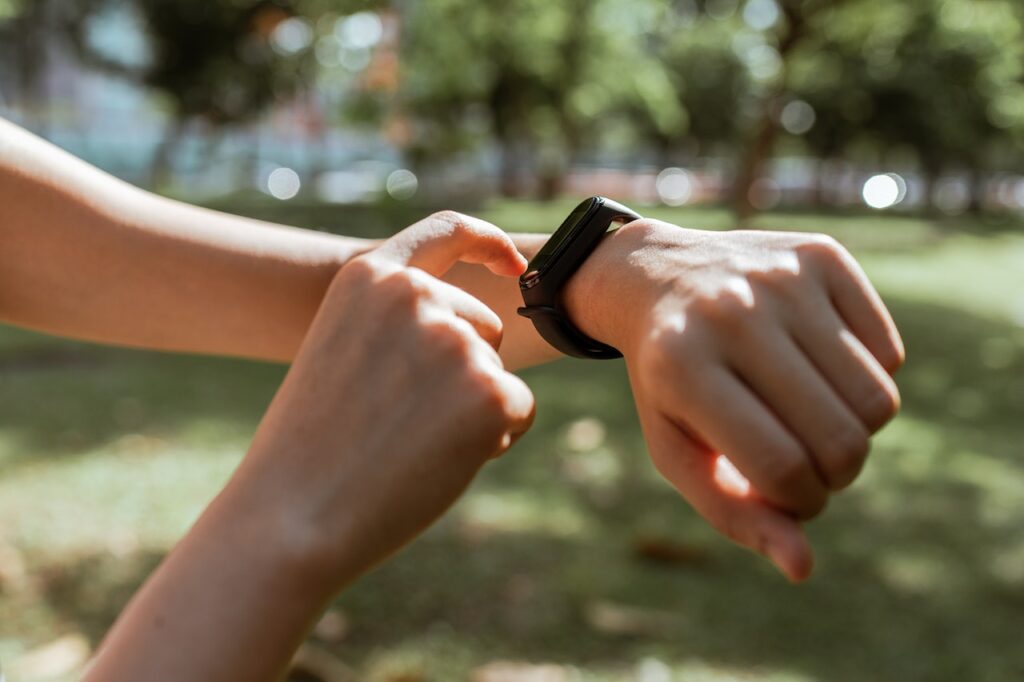Modern technology really does know no bounds, and the smart watch is just one example of that! Smart watches have become a staple in the modern wardrobe, with most people now possessing some form of smart watch to check their messages and count their daily steps. But what many people don’t know, is how much more your watch is doing for you without you even realising it.
Smart watches are constantly collecting data, that’s what they do. They come with multiple built-in sensors designed to track your heart rate, sleep cycle, and even blood oxygen levels, for example. This data is collated and used to create an overall picture of your health, making it quite easy to detect when something is wrong. Now your watch can pick up subtle changes which could alert you to an impending illness, a more serious underlying health concern, or even how to improve your sleep routine for a better night’s rest.
How do smart watches work?
Smart watches are seriously clever pieces of kit, wrapped up in such a small accessory that’s still comfortable to wear… But how is it so good at tracking our health?
If you’re already a smart watch owner, take it off and turn it over. On the back you’ll see a green flashing light- this is what is used to measure your heart rate. Spectroscopy informs us that green light is absorbed by the blood under the skin, as red and green are opposites on the colour wheel.
Using this technology, smart watches can measure heart rate with photoplethysmography. The smart watch will measure changes in the concentration of red blood cells as the blood vessels expand and contract. Expanded blood vessels absorb more green light whilst contracted vessels absorb less. A built-in software algorithm will then convert the measurements of light intensity into your pulse rate. The most recent models are so fine-tuned that they are able to monitor your pulse and detect subtle changes, such as atrial fibrillation. Pretty incredible for such a small accessory!
Another seriously cool and potentially life-saving feature is measuring your blood oxygen levels. This works in a similar way to measuring heart rate, using light to target the haemoglobin in the blood. Haemoglobin is the carrying agent that transports oxygen around the body. Instead of green light, red and infrared (IR) light is used to measure oxygen levels. Haemoglobin carrying oxygen will absorb IR light and permit the red light to pass through, whereas deoxygenated haemoglobin will absorb the red light whilst the IR light will pass through. From here your watch can determine what level of oxygen is passing through the blood and tell us a lot about our health. And if that isn’t enough, many smart watches now come fitted with an electrodermal sensor that can detect subtle electrical changes in the sweat level on your skin!
What could your smart watch be telling you?
It’s pretty clear that our smart watches do A LOT for us without us really even noticing. But aside from checking to see how restless you were in the night or whether you smashed your daily step target, what other warning signs could you be overlooking?
1. Spending too much time sitting down.
One of the more basic applications of your smart watch is to track your activity levels. This means your watch knows when you’ve spent most of the day sitting down in front of your computer or on the sofa. Whilst this little warning sign telling you to stand up or get moving might seem like an annoying little extra, there are some serious health concerns linked to a sedentary lifestyle. Spending too much time sitting down has been associated with health concerns like diabetes, heart conditions, and dementia. So, when your watch tells you it’s time to stand up and go for a walk, it’s probably a good idea to take some notice. You can even set yourself some activity targets for the day so you can see if you’ve met your move goal.
2. Heart problems
By tracking your heart rate and pulse, your smart watch can pick up some subtle signs that could indicate an underlying heart condition. Atrial fibrillation, an irregularity in the heartbeat that means blood is not pumped as efficiently around the body, can be detected by your watch, for example. The good news is, with most things like this, if they’re picked up early then treatment can be administered to minimise the risks. A lot of these conditions can fly under the radar for a long time before they’re noticed, so your smart watch can make a huge difference in finding and diagnosing any potential problems before they have a chance to seriously impact your overall health.
3. Sleep cycle
If you sleep in your smart watch, then you’ll be able to track how well you slept throughout the night. If you’ve been waking up tired or struggling with your energy levels throughout the day then your watch might be able to give you a good insight as to why this might be. Even if you think you’ve been sleeping through the night, your sleep tracker will be able to tell you how much of the night was actually spent in REM sleep. The body and brain need to spend approximately 20-25% of the night’s sleep in the REM stage, otherwise, it doesn’t have the time to properly rest and repair. Your smart watch will be able to tell you if you need to change up your bedtime routine to get a better night’s sleep, contributing to a better mood, more motivation, and a healthier lifestyle.
Some people suffer from a condition called sleep apnea, where their breathing becomes irregular when they sleep. Sleep apnea has been associated with tiredness and difficulty concentrating during the day, as well as more serious health concerns such as high blood pressure and the increased risk of a stroke. It’s still a largely undiagnosed condition, and most people who have it aren’t aware- that’s where the smart watch comes in. Your watch will be able to alert you if you were breathing irregularly throughout the night and indicate any periods of restlessness on your sleep tracker.
4. Respiratory problems
Thanks to the nifty technology that measures the amount of oxygen travelling through our blood, your watch is able to identify any potential problems you may be having with your lungs. If your watch is picking up on lower oxygen concertation in the blood, this might be a sign that your lungs aren’t working as effectively as they should, or that there is a problem with the carrying agent (haemoglobin) in the blood. Either of these should require medical investigation and, if left untreated, could cause some significant health defects in the future.
5. Infection
More recent research has shown that your smart watch is even able to detect the earliest signs of an infection, by monitoring heart rate and using the electrodermal sensor we talked about above. It is able to flag early and usually covert signs of an illness before noticeable symptoms appear- pretty impressive right? Whilst it might not do anything to prevent the illness or infection from occurring, you will be able to take the necessary precautions needed to recover as quickly as possible.
With so much information at your fingertips, it’s easy to get sucked into tracking every little thing available, but that can lead to increased stress, anxiety, and obsession. Make sure that whilst you’re monitoring your smart watch, you aren’t becoming too fixated on it and reading into the little things too much. If you’re concerned then do consult your GP, but make sure you’re still checking in with your body and how you’re feeling on your own without your smart watch. Remember, you know your body the best and if something doesn’t feel right this is your sign to trust your gut! Your smart watch is there to give you some warning signs to look out for but at the end of the day, you know your body better than anyone else.
Have you downloaded the Morale app yet? If the answer is no, then you’re missing out! Morale is the place to be for mental health, powered daily affirmations you and your friends can send each other daily words of encouragement and empowerment to make sure you’re tackling every day with a positive attitude and a lot of self-confidence. Head over and download the app now from Google Play or Apple’s App Store.
We’re always busy over on our social media, so head across and check us out so you can stay in the loop with all of our regular updates.
We’re keen to hear what you think, so make sure you send us any feedback to hello@moraleapp.co











